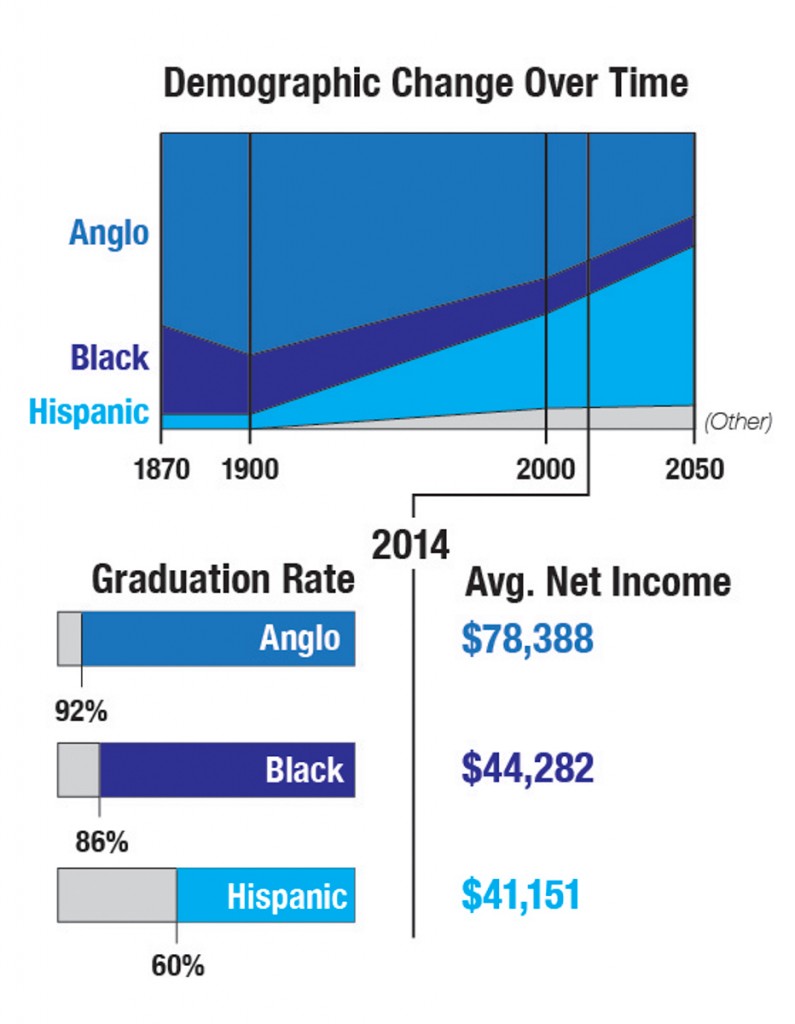By Paula Vasquez
Senior Staff Writer

Dr. Calvin Jillson, author and Political Science professor at Southern Methodist University, was invited by the Brookhaven Institute for Political Studies to talk to students at Brookhaven College Jan. 31.
Jillson’s lecture in Room K234 was based on his book, “Lone Star Tarnished.” Jillson’s analytical method led him to speak about the “Texas Miracle” redirect, which helps Texas citizens to hear not only Texas’ strengths, but also its weaknesses. Jillson said, “The general question is, ‘How well is Texas doing?’ and the broad answer is ‘Not as well as you would think.’”
According to the Southern Methodist University faculty website, Jillson’s expertise on political science dates back to 1976, when he earned a doctorate in government and politics from the University of Maryland. Ever since, he has been teaching about American politics. According to his biography, Jillson has written extensively on Texas politics, is the chairman of SMU’s Political Science Department and was the director of the Tower Center for Political Studies from 1996 to 2001.
Jillson said major areas Texans should pay attention to include income, education, access to health care and social services. Despite the general belief that Texas is doing well, “Texas has made no progress against the national average in many of those areas since 1950,” he said. Texas’ growth remains steady compared to other states because other states focus on important social services just as much as getting wealthier, Jillson said.
Jillson’s talk tackled the way Texans focus on the Texas model, or as he called it, “The Texas Miracle” and discussed Gov. Rick Perry’s role in defending this idea. The Texas model represents the relationship between government and society. Jillson said the model’s main pillars are small government, low taxes, deregulation and personal responsibility.
Although these policies have provided Texans with freedom, they date back to the formation of the Republic of Texas, Jillson said. He also referred to Perry, as the “longest serving governor in the history of Texas.”
Jillson added that Perry’s success comes from the friendly business climate in Texas that doesn’t restrict or tax heavily and attracts people to move to Texas. Jillson said Perry is a key member of government who believes Texas should not change the ageless and eternal Texas model.
Despite the alliance to defend “The Texas Miracle,” Jillson said Texas’ history raises questions about the future. He explained Texas’ current demographic population between Anglos, blacks and Hispanics “has changed dramatically over the years and is continuing to change.”
In 1870, Texas was an Anglo state with a black population of 30 percent and a Hispanic population of 5 percent, Jillson said, and the drastic change throughout the years has caused Texas’ Anglo population to shrink as its Hispanic population is booming. Jillson said the real issue is not how the population shifts but how Texas is handling it. “The demographic change is interesting but inconsequential, unimportant, of no meaning, if everybody in the population has the same education attainment and earning power,” Jillson said. The greatest challenge in Texas is the low attention and support given to graduation rates of all ethnic groups because it affects the income families are bringing in, Jillson said.
The Anglo population in Texas has a graduation rate of 92 percent and brings in a family income of $78,388. These numbers mirror statistics from 1870 when the Anglo population was dominant, Jillson said. Today, he said the Hispanic population in Texas is growing rapidly and heading to majority status, but the average family income is only $41,151.
Jillson said, “The fundamental issue confronting Texas over the course of the next several decades is whether or not these educational attainment rates change, especially among Hispanics.” Jillson said the focus on raising education attainment in Texas will help lead to higher family income by qualifying people for higher paying jobs, “as opposed to hard, often physical jobs that pay less.”
Jillson said he was captivated with the eagerness of Brookhaven students and was “impressed with the number of questions students had even after the Q-and-A.” Jillson said he encouraged students at his lecture to look into transferring to SMU and applying for scholarships. “If you do well at Brookhaven College, SMU wants to hear from you,” Jillson said.
Former Brookhaven student Jane Jillson said she believes her husband, Dr. Calvin Jillson, was inspired to speak to students because “he believes strongly in the community college system.” Jane said her experience at Brookhaven was life changing, and she is “immensely grateful to Brookhaven for providing the requirements and advising to complete my B.A. degree at SMU.” Brookhaven Professor of Political Science and Government, Dr. J. Mark Skorick, met Jillson at SMU. Skorick said Jillson is a model for young professors, and said he agrees with Jillson on the importance of investing in education for an economic future. Skorick said he admires Jillson for his expertise in Texas politics. “He is a model professor, someone who truly cares about what he does and the students he instructs,” he said.
Bob Little, government professor at Brookhaven for 40 years, said he agreed with Jillson’s message about the growth of Texas and added, “The Texas Miracle is a big question mark.”
Little said although Texas is creating of a lot of low-wage jobs, there is a possibility of social issues in the future, specifically on the labor force, “if you don’t spend on education and if you keep people poor.” Little said students should pay attention to the message Jillson gave so they can start raising questions about Texas policies. “Maybe you are saving a dollar, but long term, it’s going to be very costly,” Little said.
Little said Jillson is a “nationally- renowned scholar and a super good guy and a good teacher.” He also said Jillson’s lecture was so impressive that he will build on Jillson‘s ideas for his government courses and will try to invite him back next year.







